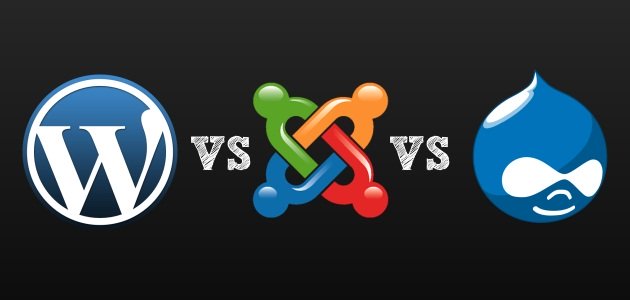I have seen this question being frequently discussed amongst start-ups and content marketers. Here’s my small attempt to help decide between which content management system one should go for.
What is a CMS?
A Content Management System (CMS) is an application using which you can create, update and delete your Content. Now this is a very loose description, and any web application where you upload stuff and manage it falls into this definition. So let me narrow this down a bit.
A CMS is a web application using which you can easily publish content on your website.
Yes, it’s the backbone software based on which you create (or have just created) a rocking website.
Why do I need a CMS?
You don’t. If your site is made of a few pages (5 or so), then perhaps you are better off with a static site. Plain Jane HTML. There actually is no need to hire an agency to create your site.
However, if you like me love writing on a regular basis on your site and keeping the site updated, with more and more pages … or have a site which is dynamic in nature (stuff keeps on happening on the site and there is never a boring time for you), then it is best to use a CMS to control what content goes live on your site.
- A Content Management System will help you manage the content that you publish in a better fashion
- A good CMS will also help you promote your content
- An ideal CMS will help you monetize your content ;-)
- The best CMS should make publishing a breeze, a process easy to perform and involving as less hassles as possible
So which CMS are out there?
There are more than a million Content Management Systems out there … no really! Talk to your average Joe, the web vendor and he would convince you to create your site in his awesome custom CMS. I know of Indian vendors out there who are doing this as their business model!!
But let me not talk about those, and focus on the ones which really matter. The ones which hold a significant share of the internet. The ones which are free :-), yes, since the free ones have a high share of the internet.
WordPress
 This is by far the most widely used Content Management System on the internet. At last count, WordPress has been powering more than 17% of the internet!
This is by far the most widely used Content Management System on the internet. At last count, WordPress has been powering more than 17% of the internet!
WordPress (yes the P is intentional, and has to be in caps!) is the proud creation of Automattic and is free to use. If you do not want to get into the technicalities and only focus on publishing, then simply head on over to WordPress dot com. If you can brave the tech part of setting up your own hosted WordPress (which is a breeze), then head on over to WordPress dot org and download the latest source.
Let me be honest with you, I am biased towards WordPress and it’s my defacto CMS.
One look at the search trends of Google will confirm this for you –
Pros
- The community around WordPress is lively and helpful
- This has the highest number of themes and plug-ins available for any CMS out there
- Did I tell you that it powers more than 17% of the internet?
- Very easy to setup and start using
- Amount of efforts in terms of knowing technology v/s getting started with a kick-ass site is quite low
Cons
- For complex requirements, you have to rely on other systems or major plug-ins. These are not as seamless as I would have wanted.
Joomla
 Unlike WordPress which started out as a blogging software and went on to become a full fledged Content Management System, Joomla started off as a CMS and was a fork of Mambo (forget about this CMS, it had its fair share of problems which Joomla fixed quite elegantly). During the initial days of Joomla, there was a lot of controversy between free software and open source (since it was formed from a CMS which was not exactly free). However the community that Joomla built was loyal and has since developed great support for it.
Unlike WordPress which started out as a blogging software and went on to become a full fledged Content Management System, Joomla started off as a CMS and was a fork of Mambo (forget about this CMS, it had its fair share of problems which Joomla fixed quite elegantly). During the initial days of Joomla, there was a lot of controversy between free software and open source (since it was formed from a CMS which was not exactly free). However the community that Joomla built was loyal and has since developed great support for it.
Although Joomla does pack a wallop when it comes down to meeting your CMS requirements, it does require a bit of getting used to and that’s why it powers 2.8% of the Internet.
Pros
- Great support and documentation available
- Built with CMS based sites kept in mind.
- Easy to roll out complex site navigations.
Cons
- Learning curve is a bit steeper and requires patience to understand the works
- Plug-ins and Themes are not as seamless as one would expect
Drupal
![]() This is the oldest CMS amongst the three, and must have seen a lot of attrition in its community base as the other two CMS’ would have been released. That also explains why this community is fiercely loyal. That also would explain the well documented help for this CMS (a developer’s paradise). This is the CMS of the techie which comes bundled with a lot of power.
This is the oldest CMS amongst the three, and must have seen a lot of attrition in its community base as the other two CMS’ would have been released. That also explains why this community is fiercely loyal. That also would explain the well documented help for this CMS (a developer’s paradise). This is the CMS of the techie which comes bundled with a lot of power.
But with all this power comes a complexity which becomes difficult to master, and hence lesser adoption rates. At 2.13% of the internet, I will not call it less, but the other counterparts are doing well.
Pros
- Well documented support centre
- Strong base with excellent core features
- Community of techies who know their CMS
Cons
- Extremely steep learning curve
- Lesser plug-ins and themes, it is assumed that the nuances you want can be implemented in-house
So which one should I go for?
I am not going to play safe and just stop at a CMS comparison, for that there are tonnes of other sites who have even done beautiful infographics on this topic. I am going to pick one of these CMS for you!! So help me out and ask yourself these questions (just pick the options!)
- Am I already familiar with any of these systems?
- Yes
- No
- How fast do I need to go to market?
- I have time, I am just toying around
- Yesterday
- Do I have a clear idea of what kind of features I want in my CMS?
- Yes
- No
If your answer is mostly 1’s then go ahead with the CMS you already know … you have the time to learn it and you know what you need to implement. Ask around in the communities and people will help you out.
If your answer is mostly 2’s then just pick WordPress and start. It is easy to learn, fast to implement and flexible at the start (since you do not know what you exactly want, you would have to do a lot of tests to determine what works for you.
What the Internet has to say about WordPress vs Joomla vs Drupal
You can say that I am biased with WordPress. Yes, I am … since these days I make my living by working on the WordPress stack. However, you do not have to take my word for it, here’s a comparison of what the Internet has to say about these three different CMSs.

Joomla is a web content management system (CMS) and is primarily used to publish content to a specified website.
Hey Chauncey, thanks for dropping by. Yes, you are correct, Joomla is a CMS and WordPress (which is what your blog is running at present) and Drupal are other such CMS’es. This post intends to compare them and suggest to users the better one.
I believe your assesment here is spot-on. WordPress is the likely choice for entry-level as the learning curve is not too steep. Judging by the number of site running on WordPress it must be very versatile.
I have found Joomla to be a good system for a multiple contributor site but not really for the rookie administrator.
I have used WordPress and Joomla but have settled on GeekLog as the foundation for my site (BlogDogIt.com) because – for me – it has proven to be better suited for modifications deep within the code.
While plug-ins and modules are certainly convenient in the development of a website sometimes (especially for someone used to building websites from the ground up) being able to modify lower-level code can be far more expedient than waiting for someone to develop the exact module you seek. As such the support side of GeekLog may seem a bit on the sparse side to the uninitiated when in reality much of the support you need will come from Linux, Apache, MySQL and Apache Forums in addition to GeekLog.net.
In discussions such as this, regarding CMS Selection, GeekLog is often overlooked which is reasonable to expect since the learning curve is probably about as steep as they come. But if you are comfortable(ish) in the LAMP technologies then GeekLog will be your more accessible choice IMHO.
Hey Masodo,
You are correct in your statement about being able to build directly touch the code (which would be nightmarish to attempt on any of these content management systems).
Will take a look at Geeklog, although in the line of CMS’es there is a large number waiting for an honorable mention, including Tumblr, Expression Engine, Cushy, concrete5, Radiant … the list goes on.
As it is, if you have the development capabilities (and the time) then the best would be to make it yourself or use one as flexible as GeekLog.
Before I landed on GeekLog I did, in fact, build my own CMS from the ground up. I still maintain that site hosted via my home DSL. I have tried to design it in a modular fashion and have found much of the code from it works nicely in GeekLog.
If you want to check it out there is a guest account set-up [ User/Pass-guest/guest at infinitelyremote.dyndns.org. ] Many features are turned off for the guest account but it illustrates the ability to control content based on assigned log-in privileges. That I think is one of the main features that separate Blogging Systems from CMSs.
Wow, did you manage to build in all necessary features in your CMS? You can think about releasing some of that code for the GeekLog community :-)
Necessary? yes for what I wanted it to do… That is the thing about off the shelf CMS solutions – they must be built with every conceivable feature in mind. This makes them a nightmare to comprehend for debugging and what-not.
While my site is not full featured I did manage to build in a user forum and user Web page hosting with file uploading/downloading and even incorporated an open source chat-room as well as a pretty decent Flash games arcade. User options to enable and disable certian features as well as customizeable RSS feed reader. (and other bits and pieces just to keep it interesting) What it lacks in elegance it more than makes up for in fun. It is a bit too “hands-on” for the administrator for me to outright recommend anyone “roll your own” but I am glad I did.
As for sharing with the GeekLog community… I try to take an active role in the support forums, in that if I ever solve a particularly difficult problem – in which I found support lacking – I will document the solution for others in the future. Unfortunately I really can’t devote the time to actually develop distributable code but I do enjoy hacking up the sites I have.
Do people still use Joomla?
Yes sir! They still do, in fact there is a thriving outsourcing community in India which relies more or less fully on Joomla!
Joomla = Bad Bad Bad!!
Wordpress = Good for users, good for designers, decent for developers, expensive in terms of time etc, good for administrators
Drupal = slightly Bad for designers, Godo for users, slightly bad for administrators, great for developers!
Haha! Very rightly put Sachin! An excellent tl;dr to the post :-)
To understand the bias of any author, I view page source and see what platform the author uses. It will tell you which one gets the most favored recommendations, no matter which weasel words are used to disguise their bias.
David, I do prefer WordPress and I am not weaseling these words around. The go to market with WP is too short to not take note.